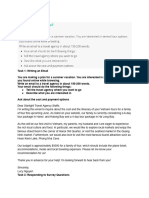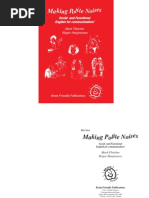0 ratings0% found this document useful (0 votes)
65 viewsĐỀ Thi Nghe FL221
ĐỀ Thi Nghe FL221
Uploaded by
Sela TranThe document describes a listening test with 8 short conversations or talks. It provides instructions for a 23 question test involving listening to each conversation twice and selecting the best response. It includes 4 sample conversations involving making an appointment, a job interview, a presentation, and a business deal. It concludes by providing instructions to listen again to the 8 conversations.
Copyright:
© All Rights Reserved
Available Formats
Download as TXT, PDF, TXT or read online from Scribd
ĐỀ Thi Nghe FL221
ĐỀ Thi Nghe FL221
Uploaded by
Sela Tran0 ratings0% found this document useful (0 votes)
65 views8 pagesThe document describes a listening test with 8 short conversations or talks. It provides instructions for a 23 question test involving listening to each conversation twice and selecting the best response. It includes 4 sample conversations involving making an appointment, a job interview, a presentation, and a business deal. It concludes by providing instructions to listen again to the 8 conversations.
Copyright
© © All Rights Reserved
Available Formats
TXT, PDF, TXT or read online from Scribd
Share this document
Did you find this document useful?
Is this content inappropriate?
The document describes a listening test with 8 short conversations or talks. It provides instructions for a 23 question test involving listening to each conversation twice and selecting the best response. It includes 4 sample conversations involving making an appointment, a job interview, a presentation, and a business deal. It concludes by providing instructions to listen again to the 8 conversations.
Copyright:
© All Rights Reserved
Available Formats
Download as TXT, PDF, TXT or read online from Scribd
Download as txt, pdf, or txt
0 ratings0% found this document useful (0 votes)
65 views8 pagesĐỀ Thi Nghe FL221
ĐỀ Thi Nghe FL221
Uploaded by
Sela TranThe document describes a listening test with 8 short conversations or talks. It provides instructions for a 23 question test involving listening to each conversation twice and selecting the best response. It includes 4 sample conversations involving making an appointment, a job interview, a presentation, and a business deal. It concludes by providing instructions to listen again to the 8 conversations.
Copyright:
© All Rights Reserved
Available Formats
Download as TXT, PDF, TXT or read online from Scribd
Download as txt, pdf, or txt
You are on page 1of 8
Listening Test.
In this test, you will have an opportunity to demonstrate your
ability
to understand conversations and talks in English. There are three parts in this
test
with a total number of 23 questions. There will be time for you to read the
instructions
and you will have a chance to check your work. The recording will be played twice.
List 1, Questions 128. Listen to 8 short conversations or talks. For each question,
circle the right
answer A, B, C or D.
Question 1. Your company's computer keyboard, monitor
and mouse could cause problems and injuries. Make some changes in work habits and
avoid
wrist injuries and other computer related stresses. Computer accessories has
produced
the most up-to-date designs for compatible computer keyboards, monitors and mouse
units.
Call now to receive information and a catalog of products.
Question 2.
Time shares go on sale at the annual meeting scheduled for September 28th in Palm
Springs.
Need buyers can participate in person, online or by fax. Last year, 90 time shares
sold
at prices as low as $500 for one week in Rio de Janeiro to $10,000 for two weeks in
Hawaii.
The sponsors of the event say resales come in at approximately 50% of the original
price.
All the time shares international office in Los Angeles at 800-555-7866 for an
advanced
copy of the listings.
Question 3.
Do you have an appointment Wednesday morning? Why? Do you want to meet about the
overseas
project? No, I want to show you the new employee work
schedule. I wondered if you'd have some free time before lunch, say 11.30?
That would be fine. I'll be between appointments then. I'll look for you in the
conference
room.
Question 4.
I'm Sarah Parker. Ms. Salah is expecting me.
Oh, yes. You're the three o'clock appointment. I'll have to ask you to sign the
visitors'
book first. And here is your visitor's pass.
Thank you. Which office is hers? It's right down the hall. Second door on the left.
Question 5.
Your presentation was very well received. Thank you. I feel that way too. I was
worried there
would be no interest, but then there were more than a dozen questions.
And you weren't nervous at all. You looked so calm and cool.
I'm glad to hear that. And I'm glad it went well and is over with now so I can
relax.
Question 6.
Have you had any news from Mr. Ling? He sent a fax this morning. He feels very
positive
about the deal. I certainly hope he's not mistaken.
I doubt that he is. He's been doing this sort of thing for a long time. He's been
with
this company for 15 years after all.
Question 7.
Ladies and gentlemen, welcome to today's program. On our talk show today, we have
three guests.
First, this is Mr. Brian Hopkins from Chicago, Illinois. Next to him is Ms. Tina
Martin from
Madison, Wisconsin. And on her left, we have Dr. James Lee from Orlando, Florida.
Welcome
to all of you. Our topic for discussion today is the problem many homeowners have
with their
neighbors. Most of us don't even know our neighbors, but some families have a
difficult
relationship with the people living next door. Loud parties, parking their cars in
front
of your house, their dog making a mess in your yard. Why can't we all just get
along?
What are some things we can do to help deal with bad neighbors? Let's take a look.
Question 8.
Welcome to the travel show. I'm your host Bob Wilkins. In part one tonight, we'll
be
taking a look at the popular resort island of Marina, and interviewing families on
a
cruise ship in part two. Finally, in our last segment, we will show you how to save
money
on your vacation. Trust me, you won't want to miss tonight's fantastic episode. We
will
start now by going to our most adventurous reporter, John Rogers. John is on the
fabulous
island of Marina. Marina is famous for its goat milk cheese. John, tell us about
the
island of Marina and some of the fantastic types of cheeses that you have tried.
Now, listen again.
Question 1.
Your company's computer keyboard, monitor, and mouse could cause problems and
injuries.
Make some changes in work habits and avoid wrist injuries and other computer-
related
services. Computer accessories has produced the most up-to-date designs for
compatible
computer keyboards, monitors, and mouse units. Call now to receive information and
a catalog
of products.
Question 2.
Time shares go on sale at the annual meeting scheduled for September 28th in Palm
Springs.
And buyers can participate in person, online, or by fax. Last year, 90 time shares
sold
at prices as low as $500 for one week in Rio de Janeiro to $10,000 for two weeks in
Hawaii.
The sponsors of the event say resales come in at approximately 50% of the original
price.
All the time shares international office in Los Angeles at 800-555-7866 for an
advanced
copy of the listings.
Question 3.
Do you have an appointment Wednesday morning?
Why? Do you want to meet about the overseas project?
No, I want to show you the new employee work schedule. I wondered if you'd have
some
free time before lunch, say 11.30?
That would be fine. I'll be between appointments then. I'll look for you in the
conference
room.
Question 4.
I'm Sarah Parker. Ms. Salaam is expecting me.
Oh, yes. You're the three o'clock appointment. I'll have to ask you to sign the
visitors
book first. And here is your visitors pass.
Thank you. Which office is hers?
Is right down the hall, second door on the left.
Question 5.
Your presentation was very well received. Thank you. I feel that way too. I was
worried there
would be no interest, but then there were more than a dozen questions.
And you weren't nervous at all. You looked so calm and cool.
I'm glad to hear that. And I'm glad it went well and is over with now so I can
relax.
Question 6.
Have you had any news from Mr. Ling? He sent a fax this morning. He feels very
positive
about the deal.
I certainly hope he's not mistaken.
I doubt that he is. He's been doing this sort of thing for a long time. He's been
with
this company for 15 years after all.
Question 7.
Ladies and gentlemen, welcome to today's program. On our talk show today, we have
three guests.
First, this is Mr. Brian Hopkins from Chicago, Illinois. Next to him is Ms. Tina
Martin from
Madison, Wisconsin. And on her left, we have Dr. James Lee from Orlando, Florida.
Welcome to all of you. Our topic for discussion today is the problem many
homeowners have
with their neighbors. Most of us don't even know our neighbors, but some families
have
a difficult relationship with the people living next door.
Loud parties, parking their cars in front of your house, their dog making a mess in
your yard. Why can't we all just get along? What are some things we can do to help
deal
with bad neighbors? Let's take a look.
Question 8.
Welcome to the travel show. I'm your host Bob Wilkins. In part one tonight, we'll
be taking
a look at the popular resort island of Marina, and interviewing families on a
cruise ship
in part two. Finally, in our last segment, we will show you how to save money on
your
vacation. Trust me, you won't want to miss tonight's
fantastic episode. We will start now by going to our most adventurous reporter,
John Rogers.
John is on the fabulous island of Marina. Marina is famous for its goat milk
cheese.
John, tell us about the island of Marina, and some of the fantastic types of
cheeses
that you have tried.
Good morning. Dave speaking. Oh hi. I'm phoning about a short story
competition. I saw an advert in a magazine, and I was just calling to get some
details.
Yes, certainly. I'm the competition organizer, so I should be able to help. What
kind of
details are you looking for? Well, does it cost anything to enter?
Yes, there's an entry fee of five pounds. Okay, that should be fine. It's a short
story
competition, so how many words is that? Well, we want to give people a reasonable
amount
of freedom, but the guidelines are around 3,000 words. Oh, that sounds quite a lot.
Well, it's not as much as it used to be. We did have a limit of 5,000 words, but
some
people thought that was too many. So this year we've reduced it.
Right, and does the story need to be about anything in particular?
No, you can write about any topic you like. But the main point of the competition
is that
it has to have a surprise ending. Oh, I see. That sounds interesting. I don't think
I've
ever written a story like that before. Yes, it's something we've introduced for
this
year's competition. Right. I'm 18. Is there any age limit?
Yes, you need to be 16 or over. So if you're 18, that's fine.
Great. So you have the competition once a year. Is that right?
Yes, we start advertising in January, and the competition takes up a lot of the
year.
We give people a few months to write their story, and then it takes quite a long
time
to judge all the entries and to announce the winners.
I see. So when is the closing date for the competition? It's already April. I hope
I'm
not too late. No, you've still got plenty of time. You need
to submit your entry by the 1st of August. After then, it will be too late.
Although you
can always enter next year's competition. Okay, good. So how do I enter?
Well, we have a website, and the best way to enter is to complete the entry form
online.
We also have more details of the competition on the site. Shall I give you the web
address?
Yes, please.
Okay. It's www.comp4ss.com, and that's the number four, not the word
four. Okay, thanks. I've got that. So I can complete
the entry form online, but how do I send the story? Do I print it out and send it
to you?
Well, you may want to print the story out so you can review it, but don't post it
to
us. When you've finished your story, you will need to email it to us. The email
address
is on the website I gave you. Okay, that's fine.
Now, listen again. Good morning, Dave speaking. Oh, hi. I'm
installer.kh4s Guy. Hey, have you got that buddy?
Oh, I'm a
competition organizer, so I should be able to help. What kind of details are you
looking
for?
Well, does it cost anything to enter?
Yes, there's an entry fee of £5.
OK, that should be fine. It's a short story competition, so how many words is that?
Well, we want to give people a reasonable amount of freedom, but the guidelines are
around 3,000 words.
Oh, that sounds quite a lot.
Well, it's not as much as it used to be. We did have a limit of 5,000 words, but
some
people thought that was too many. So this year we've reduced it.
Right, and does the story need to be about anything in particular?
No, you can write about any topic you like. But the main point of the competition
is that
it has to have a surprise ending.
Oh, I see. That sounds interesting. I don't think I've ever written a story like
that
before.
Yes, it's something we've introduced for this year's competition.
Right. I'm 18. Is there any age limit?
Yes, you need to be 16 or over. So if you're 18, that's fine.
Great. So you have the competition once a year. Is that right?
Yes, we start advertising in January, and the competition takes up a lot of the
year.
We give people a few months to write their story, and then it takes quite a long
time
to judge all the entries and to announce the winners.
I see. So when is the closing date for the competition? It's already April. I hope
I'm
not too late.
No, you've still got plenty of time. You need to submit your entry by the 1st of
August.
Later then it will be too late. Although you can always enter next year's
competition.
Okay, good. So how do I enter?
Well, we have a website, and the best way to enter is to complete the entry form
online.
We also have more details of the competition on the site. Shall I give you the web
address?
Yes, please.
Okay, it's www.comp4ss.com, and that's the number four, not the word for.
Okay, thanks. I've got that. So I can complete the entry form online, but how do I
send the
story? Do I print it out and send it to you?
Well you may want to print the story out so you can review it, but don't post it to
us. When you've finished your story, you will need to email it to us. The email
address
is on the website I gave you.
Okay, that's fine.
Questions 15 to 18. Complete the sentences below. Write no more than two words for
each
answer.
Um, can you tell me a bit about how the competition is judged and what the prizes
are?
Yes, of course. Well, once we have all the entries, I send them to all the judges.
Our
competition is quite popular, so we are lucky to be able to use famous authors who
are very
interested in the competition.
That's fantastic. It's great to know that someone famous will be reading my story.
Yes, that's right. It takes them quite a while to read through the entries, but
eventually
they decide on the top five stories.
I see. And what happens then?
Well, they will be published online so everyone can read them. They will not be in
any order
at this point. They will just be the five stories that the judges think are the
best.
And do all the top five stories get prizes?
No. It's just the top story and the runner up.
So how is the top story decided?
Well once the top five stories are available, it will be the public who will vote
for their
favourite story.
Right, I see. So I need to get all my friends to vote for me then.
Uh, yes, that's a good idea.
And what is the prize?
Well, the runner up gets a prize of £300. But the winner gets a trip to Spain to
attend
a workshop for writers.
Wow, that's brilliant. I'd better get writing straight away.
Yes. Good luck.
Thanks.
Now, listen again.
Um, can you tell me a bit about how the competition is judged and what the prizes
are?
Yes, of course.
Well, once we have all the entries, I send them to all the judges. Our competition
is
quite popular. So we are lucky to be able to use famous authors who are very
interested
in the competition.
That's fantastic. It's great to know that someone famous will be reading my story.
Yes, that's right. It takes them quite a while to read through the entries. But
eventually
they decide on the top five stories.
I see. And what happens then?
Well, they will be published online so everyone can read them. They will not be in
any order
at this point. They will just be the five stories that the judges think are the
best.
And do all the top five stories get prizes?
No. It's just the top story and the runner up.
So how is the top story decided?
Well once the top five stories are available, it will be the public who will vote
for their
favourite story.
Right, I see. So I need to get all my friends to vote for me then.
Er, yes, that's a good idea.
And what is the prize?
Well, the runner up gets a prize of 300 pounds. But the winner gets a trip to Spain
to attend
a workshop for writers.
Wow, that's brilliant. I'd better get writing straight away.
Yes. Good luck.
Thanks.
This is the end of part two.
Part three, questions 19 to 23. Listen to a lecture and circle the correct answer
A,
B or C.
First impressions don't tell the whole story. Good morning. Thank you so much for
inviting
me here today. As promised, I'm going to talk about how we form first impressions
and how
they work. We all form impressions of other people every day. So picture this.
You're
waiting in line at your favourite coffee shop. The line is long, but it's moving
quickly.
The person in front of you in line is complaining about the weight. He's loud and
rude. He
makes comments about the service and the employees. When he finally gets to the
counter, he yells
at the person who takes his order. You assume this is not a nice person, and you
hope you
never meet him again.
From this short encounter, you have formed an impression of this person. You were
with
him only briefly, but you may think you know a lot about him. One mistake people
often
make in forming first impressions is to think that a small example of someone's
behaviour
can give us a complete picture of the person. If you see a friendly, smiling young
woman
taking your order at the coffee shop, you may think she is friendly and smiling all
of
the time. In addition to thinking she is always friendly, you may also think she
has other
positive traits. This is the second error people often make.
If she is friendly, you assume that she is also intelligent, happy, and good to her
parents.
Of course, the opposite is also true. The rude customer in front of you in the
coffee line
did not make a good impression on you. You saw an example of his poor behaviour,
his
rudeness, and you assumed he had other negative traits. You thought, this is not a
nice person.
Okay, so if our first impression of someone is positive, we think the person is
always
that way and we think that all of her traits are positive. We think that small
sample of
behaviour shows us her true personality. But we don't think that way about our own
behaviour.
Let me explain what I mean. When we see someone else acting in a negative way, we
think it
is because he is a negative person. But when we act in a negative way, we say it is
because
of the situation. Let's go back to the coffee shop again.
If I am rude to the person taking my coffee order, I will find reasons for my bad
behaviour.
The service is too slow, my mother is very sick, or my boss just yelled at me. In
other
words, when I act badly, I think it is because of the situation, not because I am a
bad person.
But if another customer is rude, I don't look for reasons, I think it is his
personality.
In other words, he acted badly because he is not a nice person. First impressions
can
tell us a lot. They help us make sense of new information and form relationships
with
new people. But as you can see, we can make errors, so sometimes we need to take a
second
look.
Now, listen again.
First impressions don't tell the whole story. Good morning. Thank you so much for
inviting
me here today. As promised, I am going to talk about how we form first impressions
and how
they work. We all form impressions of other people every day. So picture this. You
are
waiting in line at your favourite coffee shop. The line is long, but it is moving
quickly.
The person in front of you in line is complaining about the weight. He is loud and
rude. He
makes comments about the service and the employees. When he finally gets to the
counter, he yells
at the person who takes his order. You assume this is not a nice person, and you
hope you
never meet him again. From this short encounter, you have formed an impression of
this person.
You are with him only briefly, but you may think you know a lot about him. One
mistake
people often make in forming first impressions is to think that a small example of
someone's
behaviour can give us a complete picture of the person. If you see a friendly,
smiling
young woman taking your order at the coffee shop, you may think she is friendly and
smiling
all of the time. In addition to thinking she is always friendly, you may also think
she
has other positive traits. This is the second error people often make. Because she
is friendly,
you assume that she is also intelligent, happy and good to her parents. Of course,
the opposite
is also true. The rude customer in front of you in the coffee line did not make a
good
impression on you. You saw an example of his poor behaviour, his rudeness, and you
assumed
he had other negative traits. You thought, this is not a nice person.
Okay, so if our first impression of someone is positive, we think the person is
always
that way and we think that all of her traits are positive. We think that small
sample of
behaviour shows us her true personality. But we don't think that way about our own
behaviour.
Let me explain what I mean. When we see someone else acting in a negative way, we
think it
is because he is a negative person. But when we act in a negative way, we say it is
because
of the situation. Let's go back to the coffee shop again. If I am rude to the
person taking
my coffee order, I will find reasons for my bad behaviour. The service is too slow,
my
mother is very sick or my boss just yelled at me. In other words, when I act badly,
I
think it is because of the situation, not because I am a bad person. But if another
customer
is rude, I don't look for reasons, I think it is his personality. In other words,
he
acted badly because he is not a nice person. First impressions can tell us a lot.
They
help us make sense of new information and form relationships with new people. But
as
you can see, we can make errors, so sometimes we need to take a second look.
This is the end of part 3. This is the end of the listening test.
You might also like
- QUIZDocument10 pagesQUIZMaterial Design66% (79)
- FCE Test 1 TapescriptsDocument8 pagesFCE Test 1 TapescriptsPedro Marchante ChichonNo ratings yet
- Operating Models PDFDocument12 pagesOperating Models PDFDhanysha Putri100% (5)
- Ote-B2-Practice-Test1-Audioscript Converted by Onlinepdfedit ComDocument10 pagesOte-B2-Practice-Test1-Audioscript Converted by Onlinepdfedit ComMario Izquierdo JiménezNo ratings yet
- Test 7Document5 pagesTest 7Quỳnh PhạmNo ratings yet
- Speaking PartDocument14 pagesSpeaking PartAna Bella FranciscoNo ratings yet
- Listening 1 Smart Book of TOEFL 1Document5 pagesListening 1 Smart Book of TOEFL 1Teuku IrhammullahNo ratings yet
- DichDocument3 pagesDichnghiak54aNo ratings yet
- Speaking Lv3Document18 pagesSpeaking Lv3Trung PhanNo ratings yet
- CELPIP Practice Test 3Document8 pagesCELPIP Practice Test 3lucy.ngtuNo ratings yet
- Transactional LetterDocument5 pagesTransactional LetterMaria-Magdalena Cirlan100% (1)
- TranscriptDocument6 pagesTranscriptanyaforger2809No ratings yet
- Vstep Writing Task 1 SampleDocument13 pagesVstep Writing Task 1 Samplehermynguyen55No ratings yet
- Test 7Document6 pagesTest 7ochilovravshan57No ratings yet
- Exercise -Listening - KEYDocument26 pagesExercise -Listening - KEYflex.tran92No ratings yet
- Listening Answers Key - Ge2-TestDocument5 pagesListening Answers Key - Ge2-Testat pps LuongNo ratings yet
- Letter Writing TrainerDocument4 pagesLetter Writing TrainerMaria SanzNo ratings yet
- 模拟试卷三听力答案及文字Document4 pages模拟试卷三听力答案及文字dingg1883No ratings yet
- Lesson 1 Attract A New Car by Joe VitaleDocument30 pagesLesson 1 Attract A New Car by Joe Vitalerveyron100% (1)
- Listen 1Document7 pagesListen 1duyht.bteNo ratings yet
- De Luyen Tap WritingDocument23 pagesDe Luyen Tap WritingXuyen PhanNo ratings yet
- Dialogue PracticeDocument3 pagesDialogue PracticeElena StanislavNo ratings yet
- 12Document5 pages12hamai281001No ratings yet
- File Nghe Cho ThuyettrinhDocument9 pagesFile Nghe Cho Thuyettrinhhueltt.23nsNo ratings yet
- Cambridge IELTS 18 - Listening Test 1Document7 pagesCambridge IELTS 18 - Listening Test 1erşan şahinNo ratings yet
- FCE Practice Test 2 PhotocopiableDocument6 pagesFCE Practice Test 2 PhotocopiableLR AllyNo ratings yet
- IELTS Listening Recent Actual Tests Vol 1-TrangDocument13 pagesIELTS Listening Recent Actual Tests Vol 1-TrangntthuytuNo ratings yet
- UntitledDocument5 pagesUntitledSekar Devi ArnatiNo ratings yet
- PRACTICE TEST 07Document10 pagesPRACTICE TEST 07hieun7718No ratings yet
- Introductions: Key VocabularyDocument11 pagesIntroductions: Key Vocabularytucurina100% (1)
- DialoguesDocument10 pagesDialoguesmenavilla31No ratings yet
- Telephoning in EnglishDocument12 pagesTelephoning in EnglishPaskaNo ratings yet
- Stand Out 3e Level 2Document4 pagesStand Out 3e Level 2Olga TorresNo ratings yet
- Test 3 TapescriptDocument9 pagesTest 3 TapescriptLê Hồng Trường HuyNo ratings yet
- Bản-sao-k27-anh-1-flowchart-20230808032854-e (1)Document12 pagesBản-sao-k27-anh-1-flowchart-20230808032854-e (1)vksmhnjNo ratings yet
- Making Polite NoisesDocument35 pagesMaking Polite NoisesYoobie Nguyen100% (2)
- ÔN THI VIẾT 2.1Document13 pagesÔN THI VIẾT 2.1Trà Nguyễn HươngNo ratings yet
- Practice Test: Ielts UsaDocument11 pagesPractice Test: Ielts UsajoseNo ratings yet
- LettersDocument2 pagesLettersaddasefddasNo ratings yet
- Do You Like Reading?Document45 pagesDo You Like Reading?Hường Đỗ100% (1)
- 20 Mars 2023 À 09:59Document4 pages20 Mars 2023 À 09:59Nofy MahalNo ratings yet
- Test 8Document6 pagesTest 8Quỳnh PhạmNo ratings yet
- Test 4 TranscriptDocument8 pagesTest 4 Transcriptletrantu2dthNo ratings yet
- B1 - WritingDocument10 pagesB1 - WritingPhạm Mai HươngNo ratings yet
- Speaking Part 2Document27 pagesSpeaking Part 2Dương Unô100% (1)
- Describing SomebodyDocument8 pagesDescribing Somebodyhicran2013No ratings yet
- The More Things Change, the More They Remain the Same: The Adventures of SstFrom EverandThe More Things Change, the More They Remain the Same: The Adventures of SstNo ratings yet
- Cefr Letters b2 and c1Document32 pagesCefr Letters b2 and c1oybekdomla1981No ratings yet
- Shorthand Writing Project: Myung Gem R. AbetriaDocument19 pagesShorthand Writing Project: Myung Gem R. Abetriaray lacayNo ratings yet
- Audio ScriptDocument0 pagesAudio ScriptelprofeleoNo ratings yet
- Speaking Part 2 VoicemailsDocument11 pagesSpeaking Part 2 VoicemailsAna Bella FranciscoNo ratings yet
- Toeic SpeakingDocument80 pagesToeic SpeakingSandra SorianoNo ratings yet
- WritingDocument31 pagesWritingkiet04082002No ratings yet
- B2 Speaking NovemberDocument10 pagesB2 Speaking NovemberMariaNo ratings yet
- Writing Đã LàmDocument16 pagesWriting Đã LàmNguyễn Hà NgaNo ratings yet
- 20 Extra Letters for IELTS General Training Writing Task 1From Everand20 Extra Letters for IELTS General Training Writing Task 1Rating: 4.5 out of 5 stars4.5/5 (2)
- Audio Scripts: Entry TestDocument2 pagesAudio Scripts: Entry TestPabloNo ratings yet
- Test 2Document9 pagesTest 2khongtranganh1862No ratings yet
- What Do You DoDocument4 pagesWhat Do You DoAlejo Intriago100% (1)
- Unit 6. Education. The Q ClassroomDocument1 pageUnit 6. Education. The Q ClassroomSela TranNo ratings yet
- File 2 - Presentation On Foot Injuries Among Sports PlayersDocument2 pagesFile 2 - Presentation On Foot Injuries Among Sports PlayersSela TranNo ratings yet
- File 5 - The Artist Samuel ProutDocument2 pagesFile 5 - The Artist Samuel ProutSela Tran50% (2)
- File 7 - Product Development Presentation - Mosquito NetDocument2 pagesFile 7 - Product Development Presentation - Mosquito NetSela Tran100% (1)
- File 4 - PLAN FOR STUDY SYNDICATEDocument2 pagesFile 4 - PLAN FOR STUDY SYNDICATESela TranNo ratings yet
- File 3 - End-Of-Year Art ExhibitionDocument2 pagesFile 3 - End-Of-Year Art ExhibitionSela Tran100% (1)
- These Words Have The Same Sound But Not The Same Meaning. The Explanation and Examples Below Show The Differences Between ThemDocument2 pagesThese Words Have The Same Sound But Not The Same Meaning. The Explanation and Examples Below Show The Differences Between ThemSela TranNo ratings yet
- 1.06 Position, Velocity and Acceleration VectorsDocument45 pages1.06 Position, Velocity and Acceleration VectorsaraneyaNo ratings yet
- Soal Toefl Lit 1Document25 pagesSoal Toefl Lit 1Khzvy 1122No ratings yet
- Sonata - XII - La - Folia Vivaldi Violin 2Document5 pagesSonata - XII - La - Folia Vivaldi Violin 2ELENANo ratings yet
- Chris Lls Publications 42610Document11 pagesChris Lls Publications 42610cifarha venantNo ratings yet
- Wonder 6 Tests Answer KeyDocument3 pagesWonder 6 Tests Answer KeyamamaNo ratings yet
- Lecture 3 - Leadership and Co-Curricular Management (Edited Version)Document19 pagesLecture 3 - Leadership and Co-Curricular Management (Edited Version)MINNo ratings yet
- Jospt 2018 0603Document5 pagesJospt 2018 0603Chris WongNo ratings yet
- The Story of The FloodDocument3 pagesThe Story of The FloodrosalacerusselNo ratings yet
- Format For Industrial Training CertificateDocument1 pageFormat For Industrial Training Certificatesanju69642580% (10)
- Aseem BhatnagDocument4 pagesAseem Bhatnagcecertificateqvc1No ratings yet
- Maritime Capability Management: Ifs Applications ForDocument8 pagesMaritime Capability Management: Ifs Applications Forharshad_kasatNo ratings yet
- Statement 24-AUG-20 AC 10176192-разблокированDocument9 pagesStatement 24-AUG-20 AC 10176192-разблокирован13KARATNo ratings yet
- Final Year of Computer Engineering 2022-23 Semester VII Project SynopsisDocument11 pagesFinal Year of Computer Engineering 2022-23 Semester VII Project SynopsisAniket JawaleNo ratings yet
- DRA BookDocument2 pagesDRA BookDrGajanan VaishnavNo ratings yet
- BVAA Valve User Issue 22Document88 pagesBVAA Valve User Issue 22Mohamed SalemNo ratings yet
- DBMSDocument16 pagesDBMSkuabhi986No ratings yet
- Ocho #19Document81 pagesOcho #19Didi Menendez100% (52)
- Chemical Economics MCQS PDFDocument11 pagesChemical Economics MCQS PDFZubair Malik100% (1)
- Cost Audit As Prescribed Under Section 233B of Company Act, 1956Document8 pagesCost Audit As Prescribed Under Section 233B of Company Act, 1956Yash ParekhNo ratings yet
- PWC Engine Examination Report Redacted-RelDocument54 pagesPWC Engine Examination Report Redacted-RelJose A. HerreraNo ratings yet
- Power and Industrial Plant Engineering TerminologiesDocument10 pagesPower and Industrial Plant Engineering TerminologiesFrei MagsinoNo ratings yet
- Altitude DivingDocument1 pageAltitude DivingLea LeaNo ratings yet
- Packing List: Karam Safety Private Limited (Formerly Known As KARAM INDUSTRIES)Document3 pagesPacking List: Karam Safety Private Limited (Formerly Known As KARAM INDUSTRIES)rajmayatraNo ratings yet
- Case Study: Flash Fire During Underground Pipeline RepairDocument9 pagesCase Study: Flash Fire During Underground Pipeline RepairManish ChandaniNo ratings yet
- Nutrition and Diet TherapyLAB2023Document185 pagesNutrition and Diet TherapyLAB2023Lance AlmonteNo ratings yet
- FULLTEXT01Document100 pagesFULLTEXT01محمد البرغثيNo ratings yet
- 12 Channel Issues CaseletsDocument2 pages12 Channel Issues CaseletsViren DeshpandeNo ratings yet
- Functions of Plant HormonesDocument14 pagesFunctions of Plant HormoneschhetridhristiNo ratings yet
- Bakuman v03Document192 pagesBakuman v03André MuraiNo ratings yet
































































































